A little hair shedding is quite common in all the furballs. Our furry mates generally lose some hair while playing and walking around. But if your kitty is losing hair to the extent of exposing bald spots, then it’s a matter of concern.
Moreover, hair loss is accompanied by symptoms like itching, sores, scratches, and redness to mention a few. Whereas, in some cases, your feline might simply face a hair loss problem.
There are two main reasons why a cat might lose hair: 1) Over-Grooming 2) Suffering from a health dilemma. So what exactly can be a reason for your cat suffering from a hair loss issue?
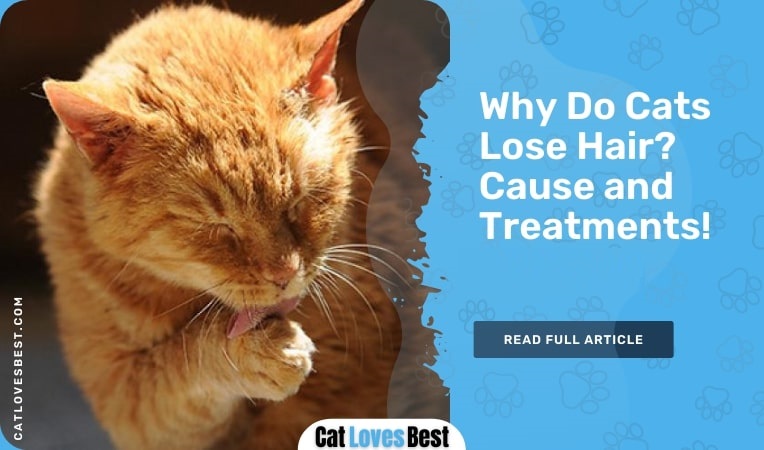
Reasons Why Your Cat Is Losing Her Hair!
There can be various reasons why your cat is suffering from hair loss. Skin allergies, ringworms, fungal infections, mange, and alopecia are few of the medical conditions that cause hair loss in cats. Another issue could be overgrooming where a cat starts licking off her own furs because of stress.
Our recent review: We tested 35+ products and found the best cat brushes for your furry friend to look and feel good.
It is essential for you to find out a correct cause to why your cat is losing her hair. A vet will examine your cat thoroughly to determine the problem and provide you an appropriate hair loss treatment. Let us see what could be the possible reason and the symptoms associated with a cat losing hairs.
1. Skin Allergies Can Cause Fur Loss
A cat shedding fur could be because of allergies caused by fleas and ticks. She will excessively lick her fur as it makes her skin irritated and to soothe her pain she will naturally lick fur.
This happens because the saliva of a flea includes antigens that cause itchiness. So, the process of soothing can lead to hollow patches in her fur because even if hair grew she will again nibble it to satisfy her itching.
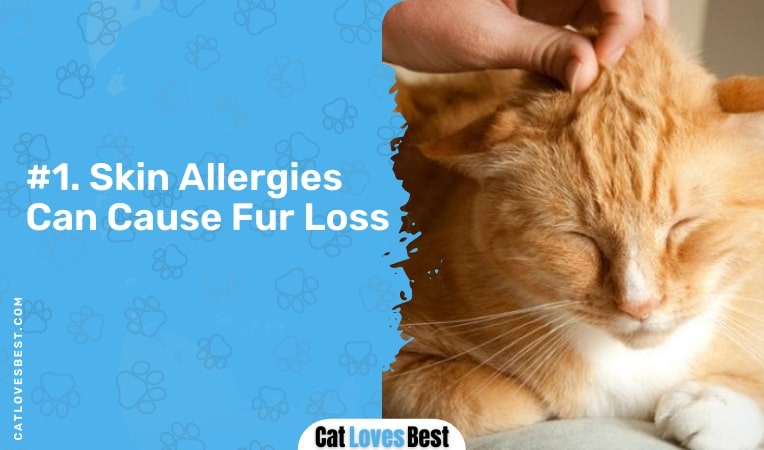
Sometimes it can also happen due to the rise of mites, lice, or food allergies.
2. Presence of Parasites
If you discover the presence of parasites like ringworm in your cat’s tummy it can also lead to cat alopecia. This is not normal or common because parasites lead to fungal infections or yeast infections.
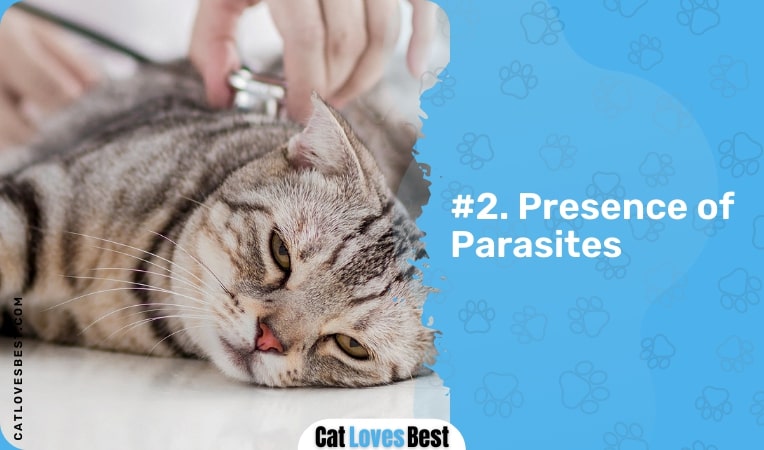
The infection will cause hair loss in the infected area. And, if not then the feline may lick the wounds excessively causing patches and loss of hair in that area.
3. Imbalance of Hormones
If your cat’s hormones are imbalanced it can also cause hair loss because certain hormones are made for hair growth which can increase or decrease the growth of hair. Hair follicles depend on hormones to work and if it is not balanced it can cause bald patches.
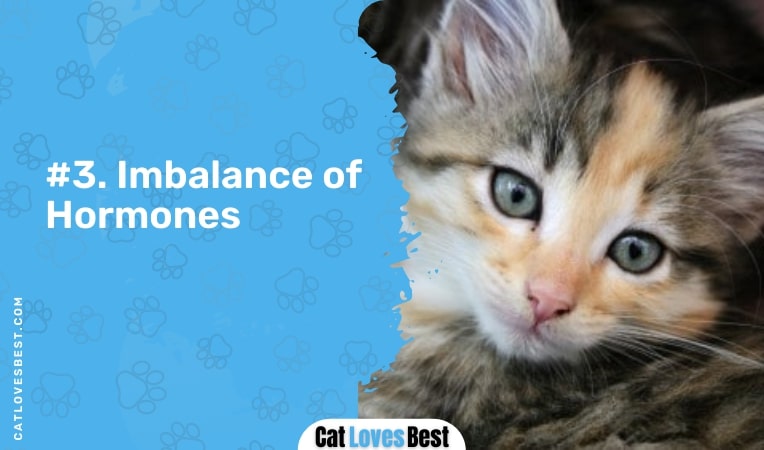
For instance, if your cat is pregnant, or she is lactating her body undergoes several hormonal changes due to which she can lose her hair a lot. But, this should stop once she has weaned her kittens.
4. Your Cat Is in Pain
Not necessarily your cat will lick her excessively when she is affected by infection or allergy she can also lose while excessively grooming herself when she is under painful conditions.
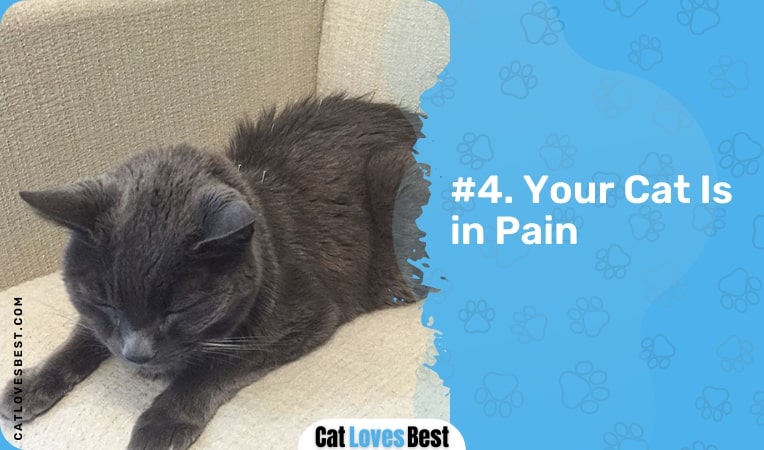
If her body aches she will lick to control her discomfort. This especially happens in the case of arthritis the pain in her joints and bones will make her uncomfortable and to reduce her pain she will start licking her joint pain.
5. Stress Leads to Hair Loss
Stress levels can increase hair loss. Wondering, how?
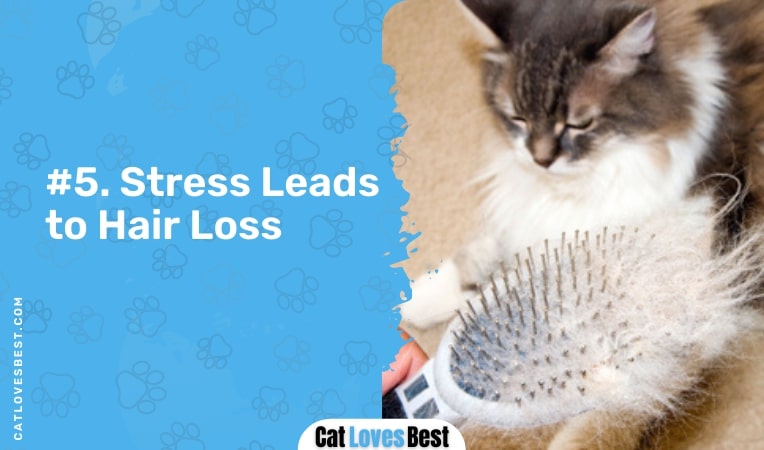
Well, a stressed cat will try to relieve her tension by licking and scratching. For instance, if you have recently shifted to a new home you will see signs and symptoms in your cats like excessive licking, and intense scratching claws and this leads to hair loss.
6. Poor Diet
Cats are carnivorous animals they solely depend on meats for their body growth and if their diet is full of grain and less of the right nutrition it can cause underlying health issues amongst which hair loss is one of the diseases.

Sometimes if she gets allergic to the food she may suffer from alopecia too.
7. After Effect of Medicines
Certain medicines can have many side effects and cause alopecia in cats. If she is using Transdermal prednisone make sure to stop it right now as it can be the leading reason for hair loss in cats.
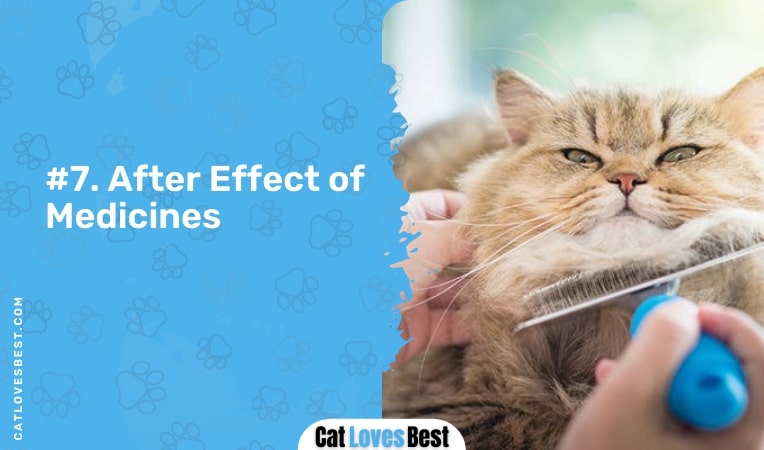
Plus if she is taking medicine for chronic illness take a note and speak to a good vet before giving it to your cat.
8. Hyperthyroidism or Diabetes
Well, it is very rare but Diabetes in cats will attack their immune system which can lead to hair loss.
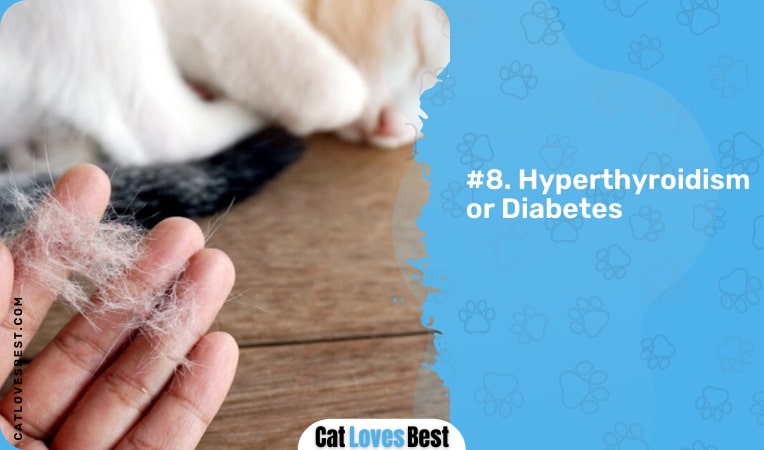
And, an overactive thyroid (Endocrine Disorders) can also cause hormonal imbalance and can increase steroids in the body which can cause hair fall.[1]
9. Dangerous Cancer
Cat losing hair due to cancer is very infrequent, but it can be one of the reasons. It may be because of the medicinal side effects or other than that it can also be because of Pancreatic cancer.
10. Mange Mites
A cat infected by mange mites may become extremely restless and sick. These mites mostly affect the face and the area around ears. In general, cats start losing the hairs from the affected part due to excessive scratching.

Common symptoms in a cat infected by Mange are:
- Itching and intense scratching
- Varying hair loss with bald patches
- Rotten looking skin
- Red bumps like that of mosquito bites
- Uneasiness and agitation
Early medical attention is a must to treat this condition. The vet will need to examine the cat under a microscope to determine the type of mange. The disease is severe in cats that have a feeble immune system.
11. Ringworms
Ringworm is a type of fungal infection that affects skin, hairs or nails. The infection looks like a red bumpy ring, that causes inflammation and itching. However, the infected areas are not always in a round shape.
In fact, ringworms are not caused by worms but by a kind of fungi known as dermatophytes. In cats, it can be very complex to diagnose a ringworm problem. This fungi typically feed on the cat’s keratin found in her furs, skin or nails. Symptoms of Ringworm in cats include
- Mild lesions on cat’s skin
- An ash-like scaling in the depth of coat
- It is infectious and spreads by touching the fungus
- Pustules in the affected area
- Flaky bald spots
- Itching and inflammation
- Hair shedding
- Scaly and greasy skin in severe cases
12. Allergies
Cats are usually very sensitive and they have allergies to a variety of things like food, pollen, dust, smoke, weed, perfumes or even plastic. Cats also get allergic to flea or mosquito bites. The following are general symptoms of Allergies in cats
- Sneezing or wheezing
- Itching and scratching
- Coughing in cats with asthma
- Itchy ears or eyes
- Diarrhea or vomiting
- Swelling in paws
A veterinarian will suggest you eliminating certain foods in your cat’s diet. The vet will give alternate food options and required medicines to treat the condition.
13. Painful disease
If your cat has a painful disease like arthritis then she will lick frequently onto the joints. This condition is more often noticed in older cats. Symptoms of Pain in cats mostly include
- Lethargy
- Hiding and sitting still
- Agitation or boredom
- Over-grooming certain spots
- Purring
- Immoderate meowing
- Not using the litterbox due to pain
Problems like arthritis do not have a permanent solution, though, a veterinarian can provide you with pain relievers to soothe the cat.
14. Psychogenic Alopecia
Psychogenic Alopecia is a psychological problem where cats over lick themselves due to stress. It happens when a cat cannot overcome trauma leading to compulsive over-grooming. Symptoms of Psychogenic Alopecia are
- Licking off fur by continuous over-grooming
- Bald patches mostly on the abdomen
- Redness, rashes or sores on the bald spots
- Scratching the affected areas
Your vet will prescribe stress relieving medicines and anti-licking collar for your cat. As the condition is related to anxiety, you need to give her more affection and care.
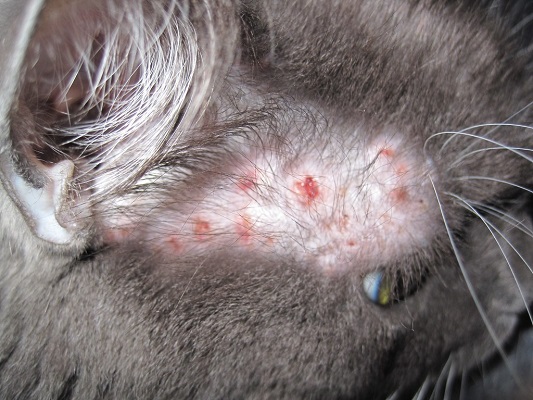
15. Rare Causes
Few rare causes for cat losing hair are thyroid, diabetes, cancer or autoimmune diseases. In a few cases, cats lose hair due to inherited illnesses. Take an appointment with the vet and get a proper examination done. Follow the instructions thoroughly to help your cat get well.
How to Treat Cat Hair Loss?
It’s important to offer healthy food, give anxiety medications, or book an appointment with the veterinarian to control fur loss in cats.
1. Change Her Food
If your kitty’s diet doesn’t include important vitamins and minerals it can cause hair loss, therefore, make sure to add lean meats and organ meats, and if you are planning to change food make sure to introduce her slowly.

2. Flea Treatment
If her fur is full of fleas and ticks, immediately get the medical veterinary tick-free shampoo to get rid of it.
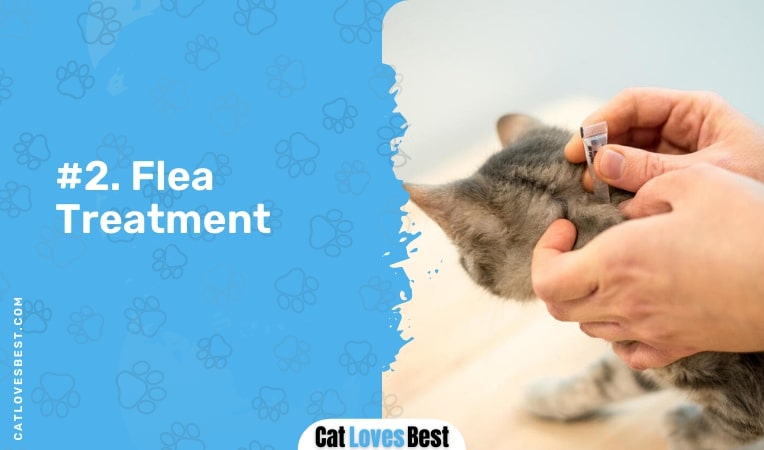
Or, you can also do one thing, go for DIY flea-free shampoo.
3. Reduce Her Stress
You can help her to keep calm by using Feliway or try to play with her. Offer her a positive environment, feed her on time, give her toys and take care of the pet’s health.
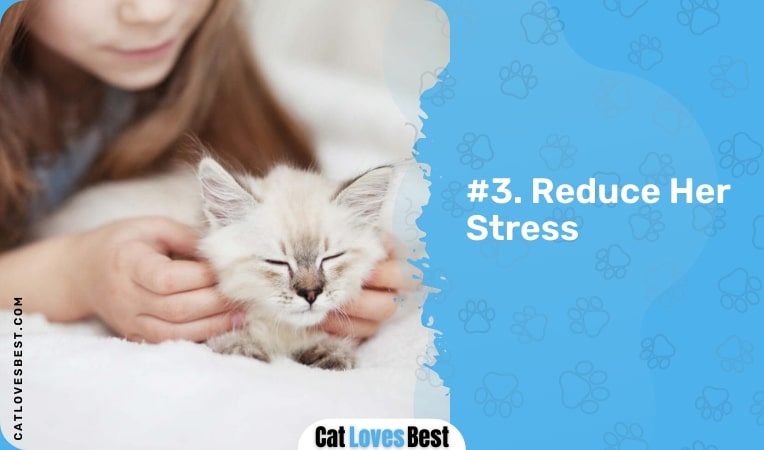
Well, That’s a Wrap!
If you wish to know why do cats lose hair and its causes and treatment do read this article. Cat losing her fur can be due to infection, allergies, or excessive grooming too.
In rare cases, a cat is losing hair can be because of diabetes and cancer. To avoid hair loss you can change her diet, reduce stress, or simply get blood work tested.
And, do share this article with other cat owners too!
References
- Diabetes in Pets. (n.d.). AVMA. Retrieved September 5, 2022




my cat is 3 years old and he has a bald spot right on his upper back near his neck and it is flaky he is also very tired than usual, please help me in finding out what he has.